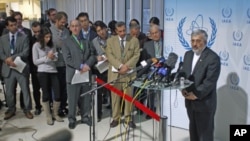Leading U.S. lawmakers are urging the Obama administration to take an even tougher stance with Iran over its nuclear program, questioning whether expanding economic sanctions are making a difference.
The Senate Foreign Relations Committee chairman, Democrat John Kerry, called Iran and its nuclear program the "biggest foreign policy challenge facing the U.S." during a hearing Wednesday. He said sanctions alone are unlikely to make Iran change course and called for Washington to engage in what he called "hard-nosed diplomacy."
The committee's leading Republican lawmaker, Senator Richard Lugar, also warned that Iran has refused to change "even as its isolation has grown." He said Tehran needs to understand it must choose between pursuing its nuclear program or preserving Iran's economic viability.
The lawmakers said the U.S. is keeping all options on the table, including the use of military force.
Iran denies Western claims it is trying to develop atomic weapons and says its nuclear activities are purely for power generation and medical research purposes.
Iran's Foreign Minister Ali Akbar Salehi said Wednesday that he expects renewed talks with the five permanent members of the U.N. Security Council - the United States, China, Russia, Britain and France, plus Germany - to begin April 13.
The group, known as the P5+1, reaffirmed its support for a diplomatic solution to the Iranian nuclear issue earlier this month. But in a statement, the group also voiced "regret" about Iran's escalating campaign to enrich uranium, and urged Tehran to open its Parchin military site to inspectors of the International Atomic Energy Agency.
Kerry said the prospect of a military confrontation gives "added urgency" to the upcoming talks.
A spokesman for European Union policy chief Catherine Ashton said there is no agreement on a time or place for the talks. But Salehi told Iranian state media Wednesday that a site will be set in the next few days.
Iran wants the meeting to take place in the Turkish city Istanbul, where a previous round of talks broke down in January 2011.
Salehi welcomed Turkish Prime Minister Recep Tayyip Erdogan to Tehran on Wednesday for meetings with Iranian President Mahmoud Ahmadinejad and other officials.
Turkey's Anatolia news agency quoted Erdogan as saying no one has the right to "impose anything" on a country using nuclear energy for peaceful purposes. He also said, though, "Anyone who has common sense is against nuclear weapons. And so no one has the right or the entitlement to impose such a thing."
| Join the conversation on our social journalism site - Middle East Voices. Follow our Middle East reports on Twitter and discuss them on our Facebook page. |




